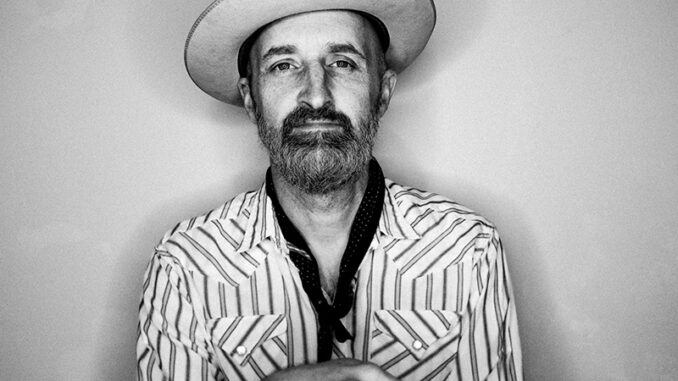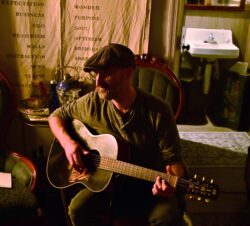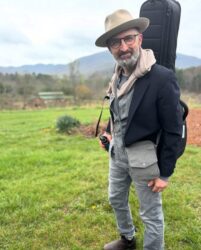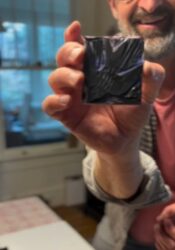
No less an authority than Delbert McClinton, who Rolling Stone once called “The Godfather of Americana Music”, remarked of Seth Walker: “The first time I heard Seth Walker at a small club in Nashville I was impressed like I haven’t been impressed in 30 years, with performance, presence, and great songs”.
Walker’s music has been described as a curious amalgam of blues, rock, roots, soul and jazz – there’s even some reggae in a couple of songs. But you shouldn’t try and pigeonhole this musician as anything but a true Americana artist, albeit a very eclectic one. Even on first listen, his songs will sound familiar, lingering, like coming back to the family home for Sunday dinner, yet he manages to take you to places that aren’t anticipated. The raw and organic tone of his dozen albums evokes the breeze and spirit of the 1970s, characterized by a wide range in styles and introspective lyricism.
Walker has a way with smooth and swinging phrasing. His guitar playing is nimble and polished. His songs can draw from the soulful jazz of Ray Charles to the southern bluesy roots of McClinton with a dash of Percy Mayfield, James Taylor and even his North Carolina neighbor, Gladys Knight, whose song ‘Best Thing That Ever Happened to Me’ he’s been covering lately.
It could be that growing up in a commune with Quaker parents informed his playing into such an eclectic mix: “I grew up playing music,” Walker noted. “My parents were both classical musicians, and it was just what we did. But I wasn’t some kind of genius cellist. I was okay but not that good.”
Walker’s father was into Eastern religions and mysticism. He gave his son the “Dao De Jing” book, which emphasizes living in harmony while advocating for simplicity and humility and non-action (wu-wei) as the path to understanding the universe and achieving personal fulfillment. “He told me this is the only book he’s read that is just a book of truth, so I can’t poke a hole in it. It doesn’t have a point of view. That I liked.”
“Your Van Is On Fire” is a book Walker wrote during the COVID shutdown, and it has absolutely nothing in common with the “Dao De Jing.” Walker calls it a mixture of some of his essays, poems, even his paintings. “I didn’t have any gigs,” he recalled, “but it was kind of like “Why The Worry”. I had nothing planned. I was just staring out the window, looking at the squirrels and started writing some of these stories.”
After living in a musical triangle for years, bouncing from New Orleans to Austin to Nashville, it’s no wonder he hasn’t rethought his choice to move to the Asheville area. If COVID wasn’t enough, along came Helene with its hurricane-force winds ripping through the area and doing more damage than a hundred bulls in a solitary china shop. “Where I live, there is Garren Creek. We’re talking a little creek,” Walker emphasized. ”I got up that morning and saw some trees blowing and didn’t think much of it. Then I saw all the shit blowing around, and the power went out. We got in the truck and drove down to where the creek meets the river, and it was like mayhem with cars and trees flowing down the river, knocking out all the bridges. My neighbor, Gladys Knight, lost her bridge, and I lost mine. We didn’t have power for six weeks.”

On his eponymous album in 2005, Walker wrote a song about hurricane Katrina called ‘Two Feet Left of the Ceiling’. In it, as the flood waters rise, a man and his dog are stuck in a room with a twelve-foot ceiling that only has two feet left. The lyrics are clever; the music innovative. It alone is worth the price. Listening to the whole album it becomes apparent that these traits are shared in all the other cuts, mostly gritty blues mixed with New Orleans jazz. Asked if he had a song in mind for Helene, he answered not as yet but maybe something will come to him.
Walker’s career received a nice boost when he met Gary Nicholson through Delbert McClinton’s Sandy Beaches Cruises. “It was a guy, Al Moss, who was an Americana radio promoter,” Walker said. “He told me I had to meet this dude, Gary Nicholson. I was a greenhorn but Gary was gracious enough to have me up to his house”.
That association eventually resulted in what one might call a breakthrough album, “Leap of Faith”. That album and its follow-up “Time Can Change” mark a shift upward in Walker’s career. Both albums were indicative of the changes that affect our daily lives and the philosophical changes that take place when we try to make sense of it all. The first cut of the latter album, ‘Love is Through with Me,’ is silky smooth, managing to envelope the listener in such a way that the vibe of the song permeates every cell and pore. Up to that point, this was Walker at his best. But still to come was a connection with Oliver Wood.

“It was a random thing, probably around 2006, and we were playing up in Iowa at this place called the Maintenance Shop. I think it’s in Ames”, Walker said, going back to that time. “I somehow got paired to open for the Wood Brothers, and I remember immediately thinking it was such an inspiring thing because we both came from blues and we have that language. Oliver is an amazing guy to collaborate with. We bounce ideas off each other, but just as we’re navigating the muse sometimes we can commiserate as well on just being out there on the road trying to balance everything”.
Oliver Wood came on to produce “Sky Still Blue” in 2014 and “Gotta Get Back” in 2016 before one of his Wood Brothers’ bandmates, Jano Rix, began producing Walker’s albums. The opening track on “Sky Still Blue” is a relaxed jazzy song titled ‘Easy Come, Easy Go’ that could be seen as a pun on moving to New Orleans (The Big Easy). Clearly, it was the influence of his stay in New Orleans that inspired the gospel-soaked fervor and gritty guitar burn at the core of this album. Walker reveled in the devil-on-my-trail dread and the longing blue notes that made songs like ‘Trouble,’ and ‘High Wire’ resonate so convincingly.
For “Gotta Get Back” Walker gathered his sister and his parents, who had been divorced for 20 years, to record the album’s beautiful, sweeping string parts, all of which were arranged by his father. ‘Home Again’ stands out as a wistful semi-acoustic song that is both plaintive and very catchy with thumping double bass from Chris Wood. ‘The Sound of Your Voice’ is a sad, romantic ballad with his family forming a string quartet which they reprise on the final track, an acoustic take on the old-timey ‘Blow Wind Blow.’

Two more proficient albums followed and then came the one-two punch of pandemic and hurricane and the beginnings of “Why the Worry”. Walker laid out the events: “When I first got into these sessions, I didn’t have an album per se in mind. I didn’t have a producer. I didn’t have Jano or Oliver or Gary or anybody like that. I was just going in there experimenting and almost backwards fell into this sound and tempo and this feeling. With all of the noise that we were dealing with in the world, I just kept coming back to this. It became a mantra for the record.”
The album title seems like a play on the old Alfred E. Neuman signature line from “Mad Magazine”, “What, me worry.” Half of the songs on the album are covers and they all have that slinky soul sound. J.J. Cale and Al Green are covered; Willie Nelson is on there, too, and the great Bobby Charles. His ‘Small Town Talk’ is on the short list of best songs ever though Walker chose ‘I Must Be in a Good Place Now’. The originals and covers are hip and fresh, and Walker shows an inspiring modern touch while still maintaining a vintage, r&b and blues appeal. His soulful singing and thoughtful songwriting add to the sincerity and authenticity of his music. This is not another hashed-out blues album.
“I wasn’t planning on putting half covers on there,” Walker said. “Most of my songs are original, but it kind of went along with the whole why the worry theme. Those were the songs that I was feeling at that time. Actually, we were just messing around with ‘Take Me to the River’. I remember going back in the control room, listening back and I was like, okay, whatever that is, I want to do more of that”.
Well, not more David Byrne songs but ‘Supernatural Thing’ was one of the later additions to the album sequence. “Obviously, it’s inspired by a lot of that West African blues rhythm that I’ve always loved”, Walker said, eyes lighting up. “I lived in New Orleans for a while, so those kinds of syncopated rhythms sneak in. We were in the studio and I was like, man, what do y’all think of this? I had this little thing on the guitar and Jano was like, let’s try it. Let’s mess with that”.
Walker wrote the title track with his pal Oliver Wood after hearing Willie Nelson speaking of wasting time and energy on worrying. Truth be told, there aren’t many better oracles to hang an ethos on than brother Willie. Walker’s classically trained father Scott added strings to ‘I’m Getting Ready’, a song penned by Michael Kiwanuka. There is a line about the one kind of love that won’t leave you crying. “I’m not a religious man,” Walker admitted, “I don’t go to church, nothing like that, but definitely there is a spiritual side I try to channel myself through”.
Jano Rix and Wood and his core band with Rhees Williams and Mark Raudabaugh do “most of the heavy lifting beforehand”, and that allows Walker to be open. “They’ll hear something I don’t hear and I’ll go, ‘fantastic, that’s perfect”.

Besides his music, Walker does more than dabble in other art forms – painting, poetry and writing. Ideas for songs come from all over the arts map. Lately he’s been reading Barbara Kingsolver’s novel, “Demon Copperhead.” An Appalachia boy is born to a teenage mom in a shabby single-wide. “Oh, man, it’s rough”, he declared. “It kind of frames the opioid problem in these rural areas, and it’s about this kid who just gets dealt a shit hand. He was born into this life and it is amazing. I mean, just getting the slang right alone is incredible. And what I really loved about it is how she disassembles this stigma that rural folks are dumb just because they may not have afforded to go to college”.
He gets a lot of his ideas while driving, which is a ton of miles on his touring schedule. His method is to mumble melodies and words until a song starts to take shape. Maybe he’s a latter-day incarnation of the old jazz trumpet player, Clark Terry, who once made a record with Oscar Peterson called “Incoherent Blues”. One song on that album is called ‘Mumbles’.
“I have about 1300 voice memos on my phone of just mumblings and sometimes through the mumble, this word or an idea will come,” Walker stated, quickly adding, “I’m not alone in this. I’ve heard of this with other writers, too. It’s like a subconscious thing and occasionally it’ll be the portal into a tune. When I was staring into the face of covid in March 2020, I came up with the line, the future isn’t what it used to be. I probably said it eating my cereal, but it gives you a way in. Yeah, I’m a mumbles man”.
Sometimes music can be giving yourself a way in, establishing connections. That’s the way Walker got started with Raul Malo when the two met on one of Delbert McClinton’s cruises. This was before the Mavericks had gotten back together. “It was just, Raul was out there singing his soul thing and we became buds”, Walker said. “He is a hilarious dude and super talented. Of course, I loved his singing and admire him tremendously. We wrote a few songs around 2009 or 10. We wound doing a bunch of tours together, me and him and his accordion player, Michael Guerra, and also wrote this song called ‘Back In Your Arms Again.’ That became one of the songs on the album when the Mavericks got back together. Then we wrote another song called ‘Moon and Stars’ that is the title track off their newest album and I sang with them on that. That was pretty cool to be a part of their record. The tune is real whimsical, “Heaven’s got the moon and stars / Funny how they always are / Shining down from high above / Never giving up on love”. The imagery and lyrics are this dream. We co-wrote it years ago, and they released it as a single last year”.

When asked if he chose the life of a musician or did it choose him, Walker answered that didn’t have a hand in the matter. Music chose him. Thinking of it that way brings you a sort of freedom to do your thing. The great guitarist, Bill Frisell, has put up online a list of 10 commandments to go over before playing a gig. Walker and his bandmates read them all before a show. “I can’t remember them all off the top of my head”, he said, “but there is: listen, take chances, destroy the idea of competition, and one that my therapist was just talking to me about – don’t think for others. That one’s pretty important”.

I asked Walker to break that last commandment and convey what he would like listeners to take away from “Why the Worry”. He pondered that one for a little while then answered: “I hope it takes them somewhere out of the ordinary life and maybe helps them release the valve on the pressure cooker. The collective consciousness these days is pretty prickly and static. Hopefully, it can bring the temperature down a little bit”.
Walker is rightly proud of his record, lyrically as well as sonically. “The muse is a funny thing”, he put forth as if hoping the muse wouldn’t hear his thoughts. “It’s definitely elusive and I don’t know when it’s coming. But the way I believe is the lyric will always guide you to what you need to do with the music. So, if you get the lyric right, everything else will follow”.
His great-grandmother had a rubber stamp collection from the 1920s that Walker used to make the “Why the Worry” cover art present a cool, old-school look. Below his name, there is an imprint of a bird. “It’s one my mother carved!”, he said with pride. “I call it the why the worry bird, just floatin’ down. Who knows where it’s headed”?


